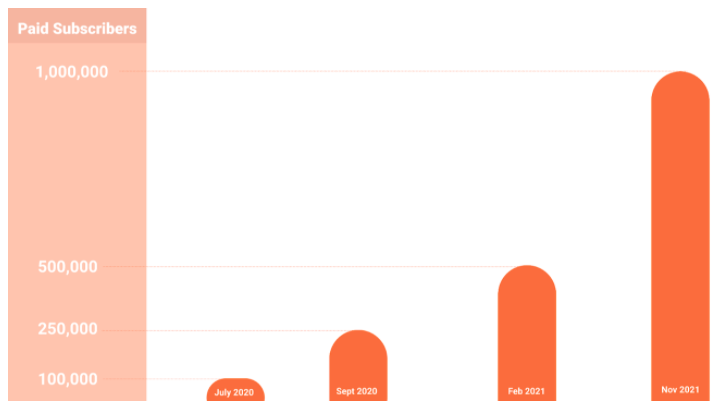ConstitutionDOA is offering Americans a piece of the US constitution, fan-tokens make their way to the NFL and Substack celebrates its 4 year anniversary with one million paying subscribers.
Substack’s first 1000
(From First 1000, by Ali Abouelatta)
Substack made a bet that media businesses would increasingly compete on the differentiation axis over the cost axis (optimising for trust and value per customer over distribution and # of customers).
Substack doesn’t sell a product, it sells trust. Writers own their customer relationship, can leave as quickly as they join & the platform is free regardless of list size.
Main risk: authors reliance on social media for distribution.
Fan tokens
(From Huddle Up, by Joseph Pompliano)
Over $1 billion has been pledged by FTX and Crypto.com to various sports leagues, including the NBA, MLB, and UFC. The NFL, however, banned sponsorships to crypto trading firms.
Rober Kraft and the New England Patriots are bypassing the rule and signing with the blockchain fan-token platform Socios.
Socios acts as a scaled down DAO: fans buy tokens to win benefits such as VIP access, team voting opportunities and more.
Main problems: (1) decision input opportunities need to be meaningful and (2) the volatility of Chiliz.
Let’s buy the US constitution
(From Not Boring, Packy McCormick)
ConstitutionDAO was set up in three days - to allow Americans to buy a copy of the US Constitution at its auction (yesterday).
It’s the only surviving privately-owned copy left and proceeds will be distributed to a non-profit specialized in democracy education.
Web3 is helping Americans come together and outbid wealthy institutions and collectors with an auction that will prove the value of DAOs - there is democracy in code.
Web3 critics
(from Divinations, by Nathan Baschez)
The two biggest critiques of web3: (1) almost anything done on blockchain can be done in web2; (2) web3’s main application is speculation and money laundering and progress is slow.
However, (1) web3 is more about re-inventing than inventing and ultimately, open systems usually win; (2) no one is in control, it’s a positive that things are slow.
The next step for Web3 is expanding on ideas to build unique new value without permission or platform risk; to create positive network effects.
A carbon short-squeeze
(From The Diff, by Bryne Hobart)
19/20 of the largest carbon emitters have settled on date for reaching net-zero emissions, here’s how it could be done:
New technologies that start small and then compound - solar efficiency, batteries, carbon capture and sequestration.
Taxes and subsidies to enable the global economy to undergo a sequence of step function upgrades in carbon efficiency, followed by a lull and trade-offs.
Bring an average to the logistic growth curve by reducing emissions from new technologies and and eliminating emissions from old ones.
Extra Reading:
DAOs: community evolution from Web2 to Web3 (Lisa Xu, Medium)
Future of crypto-native brands (The Sociology of Business, Ana Andjelic)
Taking a 10,000-foot view (Digital Native, Rex Woodbury)
Investing when inflation is high (Of Dollars and Data, Nick Maggiulli)
20 frameworks on startups, investing, writing & life (The Curiosity Chronicle, Sahil Bloom)
6 rules when hiring for growth (Lenny’s Newsletter, Lenny Rachitsky)








